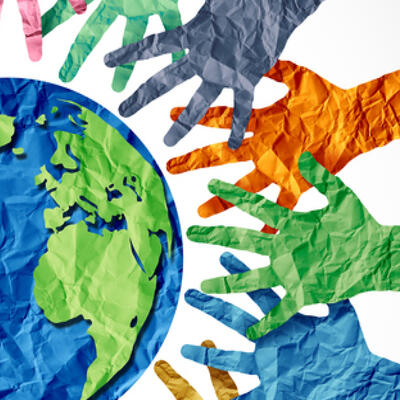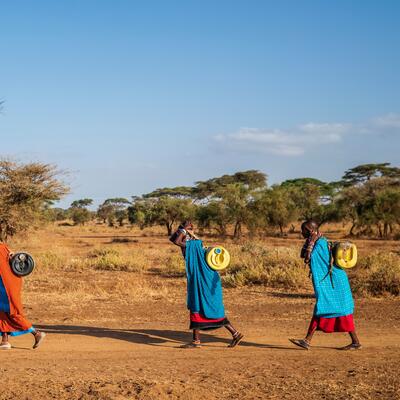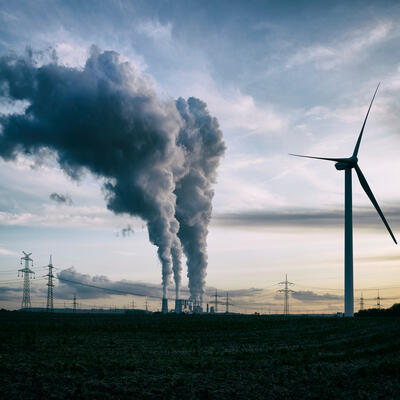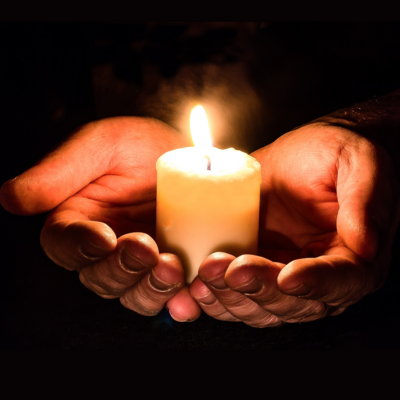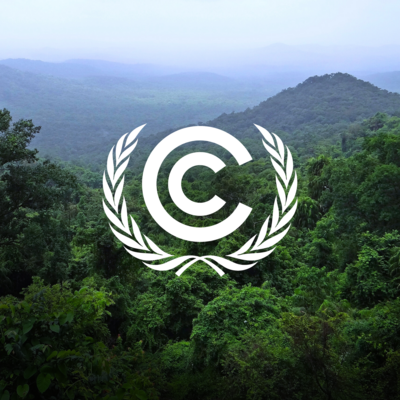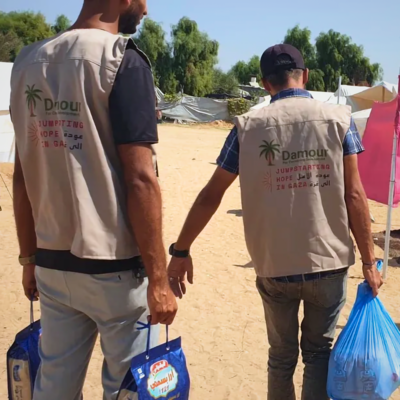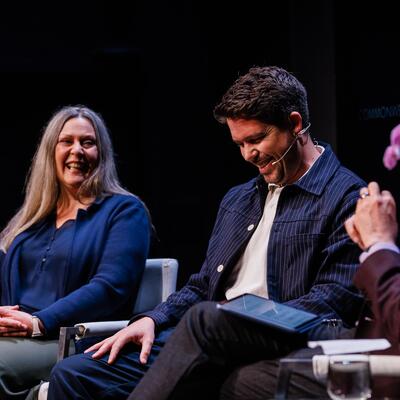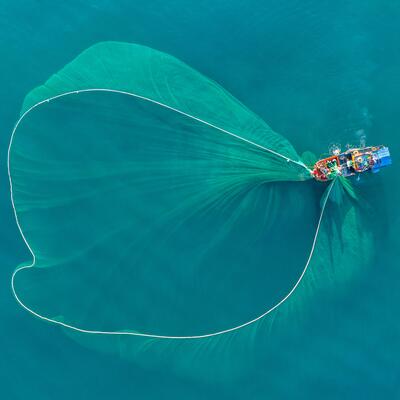
On the Ground at COP27: Tallying Payments and Progress
Guests
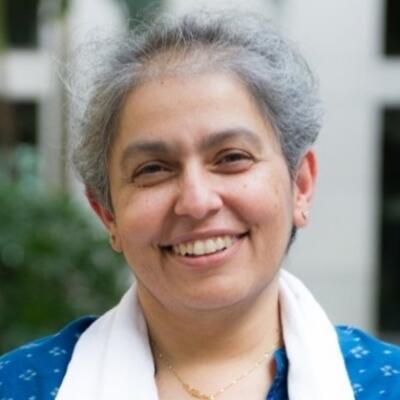
Preety Bhandari
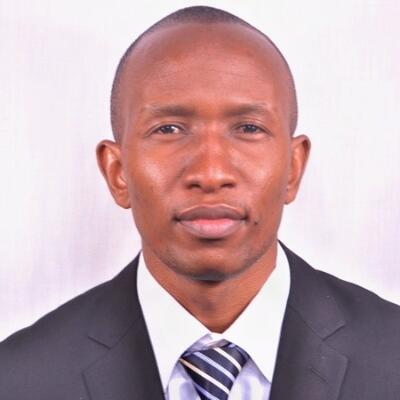
David Munene
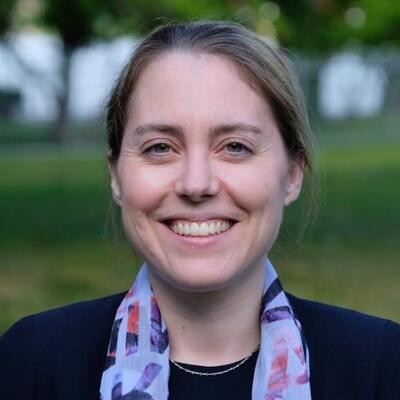
Claire Stockwell
Summary
The 27th UN convention on climate change, known as COP27, is now underway in Sharm El Sheikh, Egypt. For the first time the agenda includes loss and damage - accounting for the destruction forced upon developing countries caused by wealthy nations burning fossil fuels.
While formally discussing loss and damage is a step forward, Preety Bhandari, senior advisor with the Global Climate Program and the Finance Center at the World Resources Institute, says it’s a baby step.
“What is being paid for? How will it be paid for? Who are the responsible actors or countries that have to pay for loss and damage in vulnerable developing countries? That is where the rubber hits the road,” she says.
“[That] the president of the COP in his remarks reiterated that the consideration of financing for loss and damage is in no way related to liability compensation is a reassurance, I would say, to wealthy rich countries that this is not going to open the floodgates for future litigation,” Bhandari added.
That’s disappointing to COP participant David Munene, programs manager with the Catholic Youth Network for Environmental Sustainability in Africa. He says wealthy nations need to apologize and take responsibility for the harm they’ve caused others, in addition to paying for it.
“For me, loss and damage, as a Kenyan, means loss of heritage. It means loss of culture,” he says. And he’s angered by the disparity fossil fuel burning in the Global North has caused in the Global South as climate disruptions increase everywhere.
“Sometimes it's a mix. Anger, devastation and pity. Because I pity that people would be comfortable on the 14th floor when the ground floor is caving in,” he says. “But I'm also angry that the conversations they hold seem to consider some of us as children of a lesser god. It's as if we are having a conversation about two different kinds of human families instead of one.”
One major focus of the conference is implementing national plans to cut heat-trapping emissions and keep global warming below 1.5 degrees. Those plans – known as nationally determined contributions – are being disrupted by Russia’s illegal invasion of Ukraine, which caused a rush to expand methane gas production in other countries to replace Russian supplies.
Claire Stockwell, senior climate policy analyst with Climate Analytics, says her firm is concerned that the oversupply of methane gas being developed now will put the 1.5 degree limit in jeopardy.
“You'd have to phase out all of the coal tomorrow if you wanted to build all of the gas that we’re potentially oversupplying. So that just gives you a sense of the magnitude,” she says. Those new gas supplies won’t help in the immediate winter ahead and could become stranded assets down the line.
Climate Analytics is the research firm behind the Climate Action Tracker report that evaluates national pledges. Stockwell says most countries still aren’t reducing emissions fast enough. Only a few have strengthened their targets as they said they would after last year’s climate summit.
“If you include all the net zero targets, so all the commitments of governments that have said that they're going to go to net zero, we estimate that would lead to 1.8 degrees of warming at the end of century,” Stockwell says.
Related Links:
COP27 Conference
Climate Action Tracker
Full Transcript
“Note: Transcripts are generated using a combination of automated software and human transcribers, and may contain errors. Please check the actual audio before quoting it.”
Greg Dalton: This is Climate One, I’m Greg Dalton. And this week we’re on the scene at the international climate summit known as COP27 in Sharm El-Sheik, Egypt. Our team has been immersed in the conference of parties and today we bring you interviews from those here making the case for climate action.
Greg Dalton: This year’s COP is being held on the African continent, and location matters. As Climate One’s Senior Producer Brad Marshland tells us, Egypt has a long, long history of recognizing the importance of a stable climate.
Brad Marshland: I'm at the Temple of Khnum on Elephantine Island, a thousand miles upstream from where the river Nile flows into the Mediterranean. Here, the ancient Egyptians built what today we call a Nilometer, a series of steps leading down to the water with inscriptions on the walls to measure the height of the flood.
Makbola: Khnum was a God of the city. And ancient Egyptian believed that, that God responsible for protecting the source of the Nile,
Brad Marshland: That's Makbola, a guide in Aswan.
Makbola: So he must be satisfied all the time because if he's angry, it mean that there is a problem with the source of the Nile.
Brad Marshland: To someone who grew up in the California suburbs, where buildings constructed way back in the 1800s count as old, the time scales of Egyptian civilization are mind boggling. 3500 years ago, Egyptian archaeologists were discovering tombs and texts that were already a thousand years old to them. This incredible civilization owes its longevity to one primary resource:
[water sounds]
Brad Marshland:The Nile.
Giulio Boccaletti: It’s sort of remarkable that this land, which is fed by waters that come from Lake Victoria and the Blue Nile on the Ethiopian mountains, is incredibly rich – to the point that this narrow strip that runs along the desert at the time at the height of the middle kingdom was capable of feeding probably a third of the world’s population.
Brad Marshland:That’s Giulio Boccaletti, author of Water, a Biography. He says that the flood predictions made here, at the upstream edge of the ancient Egyptian empire, allowed the pharaohs’ administrators to plan: to store more grain in times of plenty, in order to make it through leaner years.
Giulio Boccaletti: The story by the way is told in the Bible in the guise of the famous story of Joseph. So, the seven fat cows that come out of the Nile and followed by the seven starving cows – there’s some archaeologists that that story is the memory of that strategy to manage the variability of the Nile. Occasionally would fail, occasionally they wouldn’t be able to store enough water, enough food to ride periods of scarcity. But all in all, they lasted for longer than any of our civilization; they lasted for 3000 years.
Brad Marshland: And that dependence on natural systems is just as important today
Wael Aboulmagd: First and foremost, water, water, water, water.
Brad Marshland: That’s Egyptian Ambassador Wael Aboulmagd, Special Representative of the COP27 President.
Wael Aboulmagd: Particularly because Egypt is a very, very arid country we rely on one source more than 95% of our home use, agriculture, industry, everything depends on the River Nile. So, any disruptions caused by climate change in the area of water resource management is a problem for us.
Brad Marshland: The Nile River Delta remains critical for agriculture in this country of over 100 million. And Aboulmagd says that climate-driven sea level rise compounds the threats.
Wael Aboulmagd: So, the rise in the Mediterranean by even a fraction of a centimeter means salinization and acidification. And you can just imagine the economic and social and other impacts that this would have on the livelihoods of everyone living there not to mention on the food security aspects
Brad Marshland: So today, the dependence on a stable climate is just as critical as it was thousands of years ago. And at the international climate conference in Sharm el Sheikh, the threats to water and food security, to lives and livelihoods expressed by Egypt are being echoed by nearly every country in the world, on ever more pressing time scales.
Wael Aboulmagd: Climate will not wait for us, there is no time to waste. And every measure delayed is a measure that is going to be that much more difficult to implement and multiple times more expensive to implement.
Brad Marshland: But whether the leaders of the world gathered here at COP 27 can deliver the necessary measures – at the pace required to avoid the most catastrophic impacts – remains to be seen. For Climate One, I’m Brad Marshland in Sharm el Sheikh, Egypt.
Greg Dalton: One focus of the conference is implementing national plans to cut heat-trapping emissions and keep global warming below 1.5 degrees. Those plans - known as nationally determined contributions - are being disrupted by Russia’s illegal invasion of Ukraine, which caused a rush to expand methane gas production in other countries to replace Russian supplies. I met up with Claire Stockwell, Senior Climate Policy Analyst with Climate Analytics, the research firm behind the Climate Action Tracker report that evaluates national pledges. I asked what impact the methane boom will have on the 1.5 degree limit.
Claire Stockwell: Well, what we're really concerned about here is that it's gonna put that limit in jeopardy of being able to be reached. So we're sort of overreacting to the Russian’s invasion and we're building oversupply. You know, I could give you a bunch of numbers, but if you wanna sort of make it meaningful, the International Energy Agency, so this is one of the main institutes that does energy policy and puts out scenarios, they updated their net zero scenario a couple of weeks ago, and in that scenario for the first time, they're showing a significant reduction in natural gas from last year. And that's being driven by the drop in the cost of renewables and other options, battery storage and other technologies coming online a lot faster. So first we're seeing we're gonna need less gas. Now in response to the Russian invasion we seem to be oversupplying it and the extent that we may be oversupplying it, it's equivalent we think about to, if you look at the amount of coal that we anticipate is in that pathway, you'd have to phase out all of the coal tomorrow if you wanted to build all of the gas that we’re potentially oversupplying. So that just gives you a sense of the magnitude there of this oversupply.
Greg Dalton: Right, and this is what suppliers do. Gas prices are high. So suppliers rush into the market wanting to get those high prices. And I think your report says that in 2030, the oversupply of LNG could be the equivalent of almost five times the EU’s 2021 Russian gas imports and double of Russia's exports. So this really is a glut in the making.
Claire Stockwell: It is, and if you, if we, I guess we don't know if all of this capacity will come online, but the problem is there's a risk, and the risk there is twofold. One, it's either that it does come online and it puts the 1.5 degree target at risk, or that we build all of this and it becomes a stranded asset and then someone's going to end up paying for that stranded asset. In the European case, you know, we're here at an African COP. A lot of where they're looking to build and trying to expand to is in Africa, and that would be a stranded asset here that will be dragging down on their development, whereas instead, they could have been focusing on either shifting to hydrogen or building out their renewable sectors and things like that. So that's why we're very concerned with it.
Greg Dalton: Well, one thing I learned, I think mentioned in your report by one of your colleagues, is that some of the advocates for new gas suppliers saying, well, we can just kind of rework it for hydrogen later. Is that viable? If, if there's too much gas, we'll retool the plants and, and make them process hydrogen.
Claire Stockwell: That's a decision you need to make today. Because you need to know building in advance. I need certain types of steel. I need to build it in a certain way, so that's not something that, Oh, that's a quick fix. I'll do gas for five years and then we'll switch to hydrogen or something. You need to make that investment decision today and that costs money, and all of this is happening at such a speed. We're concerned, are you really doing that planning and that thinking so that you can ensure that transition to green hydrogen in the future.
Greg Dalton: Though this is being driven partly by market players, suppliers, gas companies, Canada, US elsewhere, but also by European politicians. And isn't it natural for any elected politician to want their voters to be comfortable to not freeze in the winter and fry in the summer? So isn't the rush for reliable immediate energy supply logical and understandable by Europeans.
Claire Stockwell: The problem is there's a disjuncture between the timeline of when a lot of this capacity would come online.
Greg Dalton: It's not gonna be for this winter.
Claire Stockwell: It's not going to be for this winter. And so, you know, I'm Canadian. There was a question on whether Canada could build out some of its supply in the east and ship that to Europe. That's gonna take a few years. And when you look at the timelines, it's sort of this year, next winter that Europe needs, is in the energy crisis and when you could really get the LNG online is a much further timeline. So here we would want Europe to pursue other options. Heat pumps, they need to massively ramp up the amount of heat pumps that they're doing. There's a lot citizens can also do. I happen to live in Berlin. I've turned down my thermometer for this winter and I will continue it for this winter, next winter until we get through this crisis and save energy as much as you can. So, I have a very privileged position. I've live very comfortably. We want people to be sort of safe and comfortable in their environments, but at the same time, there are other options that don't involve this dash to gas.
Greg Dalton: Energy is a notorious boom and bust cyclical sector with like these wild swings and supply and prices. This seems like another cycle, but the difference there is that the climate's at risk. This is not just like another boom and bust cycle. Is that fair?
Claire Stockwell: Yeah. That we're worried about the locking in gas that if we sort of overreact and we lock in the gas now, then someone's going to want to use that infrastructure and that would delay the transition to renewables and then put that 1.5 degree temperature at risk.
Greg Dalton: In another response to Russia's invasion, European Commission President Ursula von der Leyen has called for stepping up renewable investments. How is that shaking out, especially in comparison to increasing gas capacity?
Claire Stockwell: Well there in the EU renewable energy plan that they put out, they did increase their renewable energy targets and that would allow them to overachieve the targets that they've committed to at the UN. So that's definitely a very positive aspect of the plan. But we still think they need to move further there and they can do more in the renewable energy space. And that means also coming back to this context and the negotiations, they can strengthen their target further if they continue down accelerating renewable energy.
Greg Dalton: So going back some years, methane gas, sometimes called natural gas, branded as natural gas was sold as a bridge fuel to a renewable future. The IEA has declared the end of the golden age of gas. Yet is methane still seen as a bridge, say from coal to renewables in some parts of the world? Is that bridge argument still holding sway in some places?
Claire Stockwell: Well, it's not a bridge. I think that's the simple answer and what you worry about there. We do need to just shift directly into renewables. The cost of renewables is coming down. And, for a lot of places where I think people where the argument may still hold sway is it's this question of finance. And here at the negotiations, developing countries, they need a lot of support and a lot of finance to really unlock that acceleration to renewable energy. And so we do think that sort of unlocking and increasing the amount of finance in this process would help ensure that people don't falsely lock themselves into a fossil fuel.
Greg Dalton: Right. And I heard one of your colleagues say that the markets will lend at lower rates to build a natural gas plant than a renewable plant, which seems like a real distortion in the market.
Greg Dalton: Coal combustion reached an all time high in 2021. We've been hearing about the end of coal and the phase down, phase out of coal was a big deal at Glasgow and certainly in the United States. We've been hearing about the end of coal for a long time. It seemed to come back from the near death many times. There's a coal renaissance and there's also countries pledge to exit coal. So how is that shaking out?
Claire Stockwell: So there was a pledge last year in Glasgow. It didn't though cover. When you look at who are the major coal, like who are the countries that really use coal fire power, only three of those signed up to this coal pledge. There's 10 that use most of it. So first, in terms of those that have committed, at least in the context of the Glasgow pledge would need to expand, but it's really a mixed bag when you look at who said they would and who wouldn't because South Korea is an example of a country that signed up to the pledge, but they really don't have a credible plan yet to exit coal. So they still need to work on developing that and making the promise that they made meaningful and accelerating action towards that. Another country that did sign up to the pledge was Germany. They have brought forward their phase out date to 2030, but as we were talking about earlier with the Russian invasion, there has been a renaissance in Germany. They're turning on a couple of coal fire plants, but the government has said that they are committed to meeting that 2030 date. So, as we said in the report, that coal renaissance really needs to be short-lived to address the absolute immediate energy crisis, and then the phase out accelerated towards 2030.
Greg Dalton: Yeah. It seems to have nine lives or many lives. Coal, the death of coal has been, you know, prematurely announced many times. Some people would say that, you know, the international climate calculus, really comes down to China. They are the largest emitter. So what's going on with China? These other countries are pretty small compared to China's current emissions.
Claire Stockwell: Well, China is a big emitter, but we need everyone. If we're serious about meeting 1.5, everyone needs to cut emissions. But in China's case, China is a very important player. We need China to act, but we need everyone to act. And so there have been some positive developments this year. So they have advanced with some of the renewable energy plans that came out in their, they do have a five year planning cycle. So in some of the latest plans that they've come up, they've accelerated on renewables, but at the same time they still have a very large coal pipeline. At one point last year it had looked like they were starting to sort of phase down coal. The power shortage that they had at the tail end of last year. They seem to have walked back a little bit from, or taken their foot off the accelerator for phasing down coal. So, China still needs to implement a lot more policies and focus on cutting emissions. But there was some positive movement, at least in some areas, and that was reflected in the numbers when we looked at our policy scenario that we did have an improvement in the Chinese numbers.
Greg Dalton: So countries made some important pledges in Glasgow at the climate conference last year. You've said that countries gave themselves some homework. Did they do their homework? Who's getting an A and who's failing?
Claire Stockwell: They did not do their homework, and they didn't do their homework on two fronts. They didn't do their homework on the targets. So they had said, they looked at the numbers in Glasgow and looked at where warming was heading with the current level of targets in action. And they said, well, we’ll come back this year, we'll revisit and we'll strengthen those targets. And only a handful of countries did that. And out of the ones that actually submitted newer targets, only a handful of those were stronger targets.
Greg Dalton: So Thailand, Norway, UAE, Australia.
Claire Stockwell: Exactly. So Australia's the only G20 country that strengthened its targets. And then you had a handful of others that submitted as well. And so that has not really, while that's positive and that definitely we do see that in our numbers and it will lead to lower warming. It's not enough to bring our temperature estimate down. So we still estimate that warming from these targets at the end of the century would be 2.4 degrees. And that's the same number we had last year.
Greg Dalton: I'd like to remind our listeners we're already at 1.2 degrees from pre-industrial times. You're saying if every country meets their targets, we're still in for 2.4, double what we have now and just think about all the floods and fires and everything else that we've been experiencing.
Claire Stockwell: Yeah, and the other thing to remind there, that's the end of century warming estimate. It will continue to warm after that point. The only pathway that we have in our numbers is when, if you include all the net zero targets, so all the commitments of government have said that they're going to go to net zero, we then estimate that would lead to 1.8 degrees of warming at the end of century and that will have peaked earlier at 1.9. Everything else, the numbers that we put out show that warming continues into the next century. So that's not even the ceiling.
Greg Dalton: That's not the end of it. I recently interviewed US special envoy, Jonathan Pershing, who was formerly John Kerry's deputy who said that some countries like India are actually ahead of their stated targets. Some countries often do more than they're willing to commit to in an international arena. What do you think of that assessment that some under promise and over deliver?
Claire Stockwell: Well, we do think India will overachieve the targets that it put forward. So India was one of those countries that did submit an update this year, and it, under our analysis, it will overachieve in 2030. I guess the thing that I would say there is, when we do the estimates of where emissions are in 2030, that's under the current level of action. So the new targets aren't really going to drive emission reductions further. So some countries do that. They don't want to put forward a target that they're gonna miss. But I think this target, India can easily meet under its current emission. So we think there's much more scope for India to go further and we need India to go further for one, if we're serious about the 1.5 degree limit and put forward much stronger targets. And that's both what India would do on its own, but also what India would do with international support because India does need to start reducing emissions, but that's not something that it can do by itself.
Greg Dalton: Sure. Cause yeah, I mean they’re very coal-reliant and they're not a wealthy country. So we're sitting here, you know, at this conference with people walking around who are, it's all about climate, and I hear you we're talking about these numbers 1.2, 2.4, and knowing like they're just like some number and yet we know that huge amounts of human suffering are attached to those numbers. So how do you cope with working with these numbers all the time?
Claire Stockwell: Well, we're at 1.2 degrees of warming. And you know, anyone that turned on the news at some point this year, they saw the massive flooding in Pakistan. We have massive flooding in Nigeria now. Major losses of life, record hurricanes in the United States. Extensive destruction. And that's at 1.2 degrees. So yeah. You know, maybe the degrees and that's sort of technical detail, but we're already seeing the impacts today. It is devastating, but I think it's also, it encourages you. I don't want the level of impacts that we have now, so that's why I show up and keep coming back to these. I'd have to do the math, but you know, my first COP was 2003 in Milan. I didn't make it to all of them, but I've been here for a very long time.
And you keep coming back because we have such a beautiful world. We wanna protect it. And you just have to take that inspiration and keep coming back. It is possible. The cost of renewables is falling, The solutions are out there. We just need to keep putting one foot forward and we'll get there.
Greg Dalton: Well, thank you. Claire Stockwell is Senior Climate Policy Analyst at Climate Analytics. Thanks for sharing your insights and feels like your sincere optimism and enthusiasm here. It's lifting me up here in Egypt. Thank you.
Claire Stockwell: You're welcome.
Greg Dalton: This is Climate One. I’m Greg Dalton, at the COP27 summit in Sharm El Sheik, Egypt. Preety Bhandari is a Senior Advisor in the Global Climate Program at the World Resources Institute and former chief of climate change and disaster risk management at the Asian Development Bank.
I invited her to discuss loss and damage–which is on the COP agenda for the first time–and financing for poorer nations. But first, I asked her what she thinks of opening remarks by UN Secretary General António Guterres. He called on wealthier countries and international financial institutions to provide monetary and technical assistance to help emerging economies speed their own renewable energy transition.
António Guterres: Humanity has a choice: cooperate or perish. It is either a climate solidarity pact or a collective suicide pact.
Preety Bhandari: These are strong words and I think he's portending towards if we do not cooperate and facilitate action that developing countries have to take to address climate change, we are doomed. The window of opportunity, which we have been talking about for so many years to take climate action has been closing and is almost closed. Currently, we are already in a world where temperature has increased, average temperature has increased by 1.2 degrees centigrade.
And it is wreaking havoc in terms of climate impacts, in terms of extreme events that are taking place. I can talk about the recent event in the U.S., Hurricane Ian and the kind of impacts it had in terms of the number of people who lost their houses, the flooding that took place, and the infrastructure that was destroyed. I understand that the damage is to the tune of 60 billion and this is happening in a country like the U.S. which has the wherewithal to rebuild from these impacts. But think of a country like Pakistan, which has also recently suffered from devastating floods with one third of the country impacted by it. And the tab for Pakistan is estimated to be around 30 billion. But Pakistan is a vulnerable country that does not have the budgetary resources to respond to such a calamity. And this is what the Secretary General is talking about, that it is in that context of solidarity that there is an expectation in this multilateral process that the developed, richer nations would come and act in concert, in a cooperative facilitative manner to help the vulnerable countries deal with these kind of impacts.
Greg Dalton: So there's loss and damage within the United States. Florida gets hit, the federal government is there, but when there's loss and damage across national borders, the response is very different. COP 27 began with a surprise agreement to include loss and damage in the agenda for the first time since these meetings began nearly three decades ago. Egypt's Foreign Minister Sameh Shoukry reportedly said the compromise breakthrough agreed the discussions would focus on cooperation and facilitation, not liability or compensation. But if it's not about money, what is it about? Is this more blah, blah?
Preety Bhandari: Well, I hope, and it is sincerely my hope that we are moving beyond the blah, blah, blah, because in this multilateral process, having an agenda item is an important signal that some important decisions would be taken. And until now, loss and damage was relegated to a dialogue with no end in sight in terms of financing or any arrangements to help address loss and damage. So having it on the agenda for this COP, I think is a big win for developing countries represented by of course the full block of countries as it is known, the G 77 group of countries. And they have stood together in unison for the last one year to get this into the formal agenda of the negotiations. So it is a big win and must congratulate the Egyptian presidency for getting it the due recognition that this particular issue needs as on the agenda. But I think this is the first baby step, as you rightly said. How the negotiations develop between developed and developing countries. What is being paid for? How will it be paid for? Who are the responsible actors or countries that have to pay for loss and damage in vulnerable developing countries? That is where the rubber hits the road. And the next two weeks are going to be important on how some of these dimensions are built in for an eventual decision making and the cop president Minister Shoukry very rightly also has given a timeline within which the negotiations on financing arrangements for loss and damage should be completed. That is by 2024. So that gives a very definitive objective to work with. I would say, in terms of what would be the scope of financing, who will pay, who will wear the burden of it, and the two weeks of negotiations over here in Egypt are very, very important from that perspective also in getting at least the foundation of what the eventual decision would be on financing.
Greg Dalton: Loss and damage is about wealthy nations paying for harm they've already inflicted on the global south by burning fossil fuels. But Canada's environment minister said earlier this year that he cannot quote in good conscience, put Canadian taxpayers that liability for risks that could be limitless. Others say that creating a loss and damage fund would not open wealthy countries to legal liability. How do you see the prospect of litigation impacting the possibility of wealthy countries paying for the loss and damage they have caused?
Preety Bhandari: The issue of liability and compensation related to paying for damages, which are coming forth because of historical emissions by rich countries definitely was part of the discussions over the years. And in fact, it started way back in 1992 when the Framework Convention on Climate Change, which is the basis of all climate negotiations, was forged. And at that point in time it was a small island country Vanuatu who raised this issue of liability and compensation and why there is a need for a funding mechanism such as insurance for vulnerable countries to deal with it. But even at that point in time, there was no mention of liability and compensation in the convention. So that gives you a sense of how this whole liability and compensation issue has been avoided since the time the convention was forged. But coming to more recent times when the Paris Agreement was forged way back in 2015, and Paris Agreement does include a specific clause on loss and damage due to climate change.
But the decision in Paris was that loss and damage is not about liability and compensation. So there is a gentle person's promise over there, which was made in Paris, that this is not about liability and compensation. And to some extent, I think many of the developing countries have moved on from this issue or making it an issue of liability and compensation. The president of the COP in his remarks again, reiterated, that the consideration of financing for loss and damage is in no way related to liability compensation is a reassurance, I would say, to wealthy rich countries that this is not going to open the floodgates for future litigation.
And going back again to what you quoted from the UN Secretary General, it is a question of solidarity. It's not about just the countries. It's about the poor people who are really facing the brunt of it. And let's not forget that this may also lead to, in this highly interconnected global world, it could lead to some kind of boomerang of impacts to developed countries. If I were to give you an example from a few years back when Thailand got severely flooded and the factories that were building the machine parts for Japanese car companies could not get those. The cars could not be produced, the cars could not come to the markets in the U.S. and there was that kind of supply constraints.
Greg Dalton: Yeah. Intel chips. Yeah. They affected a lot of US companies in a way that I think a lot of people did not anticipate before that. And so you seem to be saying that because there's language in the Paris Accord that this loss and damage is not about a liability, if the US or other wealthy countries contribute to a fund, that they won't be sued. Denmark and Scotland have offered about $15 million in direct cash payments for loss and damage. What impact has that had, if any?
Preety Bhandari: I think it's an important signaling. It's not about the amount of money or how small that money is compared to the actual needs or the actual financing required, but the fact that they took this major step, again, in the context of solidarity and in the context of showing that solutions are possible if there is leadership to address this issue. So for me, as a token, this has been a very significant move by the first Minister of Scotland, Nicola Sturgeon, when last year, she was probably the only one standing and making a case for this financing. And then this year Denmark has also come forth. So it is showing goodwill, but it is also showing the art of the possible. And I would say that it is also probably goading other countries that a solution has to be found in the context of the multilateral process.
Greg Dalton: There's a report by a group called the V 20, a group of vulnerable countries, including the Philippines, Peru, Ethiopia, that says those countries have already suffered more than $500 billion in damages due to changes in temperature and rainfall driven by burning fossil fuels. Those countries would be 20% wealthier today if it were not for climate impacts. Have any leaders from wealthy countries acknowledged that they're damaging the economic growth of the vulnerable countries? Is that recognized?
Preety Bhandari: I have not seen an explicit recognition of it, but I do see some small groups in wealthy countries recognizing this as an issue and I understand a small group, Danish Church Aid, which is actually working on the ground, on the field, will be hosting an event at this particular COP wherein they will recognize their historical emissions and how they need to pay for it.
Greg Dalton: And Microsoft has now announced their intentions to remove their historic emissions for the entire history of the company, which is a corporate example of that historic recognition. Adaptation: think planting trees, raising sea walls, relocating communities after fires or floods. That's often not a money making proposition. And I've heard many people say that we need to come up with creative ideas for financing. Climate adaptation and adaptation are things that build resilience for the future, whereas loss and damage is about what's happened in the past. So what are some examples of creative ideas that could finance climate adaptation?
Preety Bhandari: Well, let me start with one idea that has been there for some time now. This is a levy on international air travel. If each one of us did our bit and paid even something small, like $5 per ticket that we purchase for our travel, and if that can go into a fund for addressing adaptation, I think each one of us can then take that responsibility, to help the vulnerable people deal with climate impacts.
Greg Dalton: That's particularly relevant as we sit here among thousands of people who all flew to this Egyptian destination.
Preety Bhandari: Sure. And I really admire the young people who have got into this particular area. And I understand that V 20 that you were talking about earlier, V 20 has set up a small window on loss and damage. About three weeks back, they launched a crowd sourcing with the young people, the Fridays for the future group, which is young people advocating for action on climate change. And they did crowd sourcing with them to give their lunch money for loss and damage. Again, it is token. It's a token. Small amount. But you know, it shows where there is a will, a way would be found. So that may not give you the billions or trillions that one is looking for, but it does show that each one of us is a global citizen and has a responsibility to take.
But apart from that, if you look at the private sector, and the windfall profits that the oil and gas companies are making currently with the current situation between Russia and Ukraine. So there have been calls particularly by the Secretary General also, that may be some kind of taxation on these windfall profits of oil and gas companies and oil and gas being a major culprit in terms of our consumption, leading to emissions. if those could be taxed, that is another source as well.
Greg Dalton: The UK did that, by the way, but they did it only for domestic use, not to give to another country.
Preety Bhandari: Yes, it comes back to how willing the leaders are to coalesce around these options. The options are known, but it is that willingness to draw on those options that is the challenge at this particular point in time.
Greg Dalton: So the students might have small amounts of money, but they kind of have some real power there. International air travel seems to make sense because it’s inherently across national borders. There's a resonance there. Mitigation is a third category of climate finance. It helps countries move from fossil fuels to cleaner energy. The richest countries committed to a hundred billion dollars per year and mitigation finance beginning in 2020, they fell about 17 billion short. They got to about 83. What progress are you seeing on that front?
Preety Bhandari: Well, we've recently seen an update of the delivery plan by developed countries on the hundred billion. They have reiterated that they will make good on the shortfall, on the target of a hundred billion by 2023. But what is of importance over here? The a hundred billion was supposed to be met in 2020. We are in 2022. So when we are talking about shortfalls, it is not only the 17 billion which was not met, but it is, if we look at 2020 to 2025, it is six years. And why I'm saying 2025 is because 2025 is when the new climate finance commitment will come into play. So, immediate years are important, and the accumulation for the period 2020 to 2025 comes to 600 billion. So painting it as just a shortfall of 17 billion is–
Greg Dalton: Actually taking us a year per, Okay. So let's get that big cumulative number, not just the per year number, cause the delay in the shortfall adds up together. The big picture here is to fund mitigation so we can stay below 1.5 degrees of heating since industrial times. How much money is it gonna take to keep us below 1.5?
Preety Bhandari: There are various estimates available, but there's one which is widely accepted that it could cost between four to $6 trillion by 2030 to put us on the right path.
Greg Dalton: So there's gaps that exist. How do we close those gaps?
Preety Bhandari: There is a lot riding on the private sector because as we know, government money or public money as it is called, is scarce. So much is riding on how financing in the private sector could be mobilized. It could be through government policies and regulations which encourage private sector to invest in the right thing. For instance, the Inflation Reduction Act in the U.S. The kind of incentives that are being given. If I were to just take the example of electric cars in the U.S.
Greg Dalton: Heat pumps, we love heat pumps on Climate One, right? You get money and that has had bipartisan support. It's not government telling you what to do, but if you do something, you get this tax benefit.
Preety Bhandari: Mm-hmm. Right. So that's a good example. And also, with the Inflation Reduction Act, it is expected to spawn a lot of technological innovation and clean energy and renewables, and there will be spillover effects then for the global economy. Also, as technology improves and better technology is hopefully made available to the rest of the world also. In some sense the money is there and that's what recently the Intergovernmental Panel on Climate Change has said that the money is there, but it is not flowing into the right geographies.
Greg Dalton: Right, right. I hear that a lot that there's not a lack of capital. There's a lot of capital. It's seeking good projects, good opportunities. There's enough money to solve this. It's just not getting to the places that is...
Preety Bhandari: Right. And that is where finding ways to provide guarantees for private capital to flow to riskier projects or riskier country context is important. And that is where guarantees maybe from multilateral development banks who are so involved in the context of developing countries can use their limited capital to unleash the prospects of private sector financing in the right direction.
Greg Dalton: Well, when renewables are now cheaper than fossil fuels, at least for electricity in most parts of the world, why does investment in renewables still need de-risking in developing countries? Shouldn't the market solve this?
Preety Bhandari: Well, in developing countries, it does need some amount of de-risking. The capital cost or the cost of the technology may have come down. But for developing countries to make that kind of an investment, they have to borrow funding. There's only limited own funding that they have. And when they go to international capital markets to borrow money, the cost of borrowing money is very high for them. And that leads to then a much higher cost than the actual technology costs.
Greg Dalton: And so they're perceived to, they pay higher interest rates cause they're perceived to be higher risk because they’re poorer countries that don't have as much money.
Preety Bhandari: Absolutely. Absolutely. Right. So how can, how can you know one, help address that issue of cost of capital for developing countries? The interest rates? And again, it links to what kind of guarantees can be provided to help them deploy those technologies at scale. And the finance world is an intricate world, as you know, and nothing comes free. So it is all about returns on investment. So how those returns of investment can be guaranteed is an important part of the story.
Greg Dalton: This is Climate One. I’m Greg Dalton at the climate conference in Sharm El Sheikh, Egypt. Let’s get back to my conversation with Preety Bhandari, Senior Advisor at the Global Climate Program and the Finance Center at the World Resources Institute. I asked her how finance can be embedded within the context of justice.
Preety Bhandari: Well, the climate justice and just transition that we are talking about at this point in time is an important part from a moral and ethical point of view in terms of what kind of climate action needs to be taken. But the private sector will not follow that argumentation per se. So it is again, what conditions are being created in countries. I can give you the example of South Africa, where a package has been developed called the Just Energy Transition Partnership, recognizing that South Africa has to transition out of coal-based electricity generation. But that means a country where there are many who do not have access to electricity. So if you ask them to shut all their coal based power plants, that is not justice, as you said. So for them to move into alternatives, like renewable energy, I'll talk about the technology bit of it. We need financing for that. So to what extent can some of the government financing, both by South Africa, but also by developed countries like, the UK and the US are part of this partnership. But how does that, again, give a comfort level to private sector to come and invest in renewable energy in South Africa becomes important. But the other part of it, the people part of it that I want to emphasize in these just transitions is when you shut down your coal power plants, when you shut down your coal mines, there are many people who would be left without jobs. So then, funding required to re-skill those people, create alternative sources of livelihoods for those workers. And that is important also. And while you're shutting down one industry, you are establishing a new clean, hopefully clean industry. So do you have the workers for that industry?
How many of those people will be absorbed in the new industries? Would it be fair? Would it be fair in terms of, does everybody get absorbed or do they have the right skill set to be absorbed or not? So it's, it's a very lead question that you're talking about. You know, it's not only about finance flowing into the right things, but how that scale of financing is mobilized, but more importantly, the people who are impacted, people who will not get the power when the old dirty industry is shut down.
But also the people employed in that industry, how do we find alternatives for them? So complicated questions. We are just beginning to see some examples and a lot is riding also on this first South Africa example and what lessons we will learn.
Greg Dalton: As we wrap up here. What do you think it will take to get the rich and powerful of the world to reduce carbon pollution and increase energy security?
Preety Bhandari: Interesting. You're talking about the rich and powerful way here, to reduce emissions and yes, I think there are again, what are the imperatives for reducing pollution. The first is if we look at the local environmental impacts. Yes, the local environmental impacts of fossil fuels are well known in terms of the health conditions, in terms of air pollution. So that is one imperative. Of course, the rich nations have the best available technology, so those impacts may have been managed to some extent, uh, but not fully. So that is one imperative. The second one, which is unraveling right now, is the dependence on one country for oil and gas. So that whole insecurity issue, has come to the fore in Europe, but it has had ripple effects across the globe as well. So European countries are definitely looking at alternatives and for a short period, they may be relying more on gas, but they have remained committed, that they will meet their commitments on climate change, and there is a renewed and a much more energized look into renewable energy and cleaner forms of energy.
So it's hitting hard the richer countries, at least the European countries at this particular time, and they are willing to go the extra mile while recognizing in the transition they are using gas. There's no denying that. But it'll probably unleash the third or the fourth revolution on clean energy. So for developed countries, the renewable energy technology costs have come down. All the various factors are right for them to stay the course on the clean energy pathway that they have committed themselves to. And that is our hope that the richer countries would then really show the way and lead the way in reducing carbon emissions because they have the wherewithal. They have the wherewithal to do it, and if they don't do it, then who else will?
Greg Dalton: Preety Bandari, Senior Advisor at Global Climate Program and the Finance Center at the World Resources Institute in Washington, DC. Thank you so much, Preety, for sharing your insights with us here among all these people at COP 27.
Preety Bhandari: Thank you, Greg. Thanks for having me.
Greg Dalton: Money is at the center of this conversation about the responsibility industrialized countries have for the loss and damage their fossil-fueled economies have inflicted on people in developing nations. Yet while money IS important, it’s not the only dimension, as I heard from David Munene, programs manager with Catholic Youth Network for Environmental Sustainability in Africa.
David Munene: Before we get to the quantifiable aspects of loss and damage, for me, loss and damage is a Kenyan means loss of heritage. It means loss of culture. It means loss of spiritual values. For example, shrines and trees that we consider to be important to our cultures, our spirituality, and our way of life. It is the loss of connectivity, connectedness with our land.
It implies the loss of lives and productivity of the lands to which we are connected from birth, we work on it, and to death, we return to the same. When it comes to the hope this, the theft, loss and damage steals away from us the hope that tomorrow is assured and it's going to be there, it's going to be better.
It also means that I carry with me a lot of anger because I've seen things that have grown around with disappear. Loss and damage, and I'm not even on the extremes of loss and damage, as a member of my community, there are others who are adversely affected. It means I've lost my sanity if you'd like, to an extent, because now I have to deal with things I don't understand that I did not, because of the special needs and circumstances of where I come from, Africa, I did not really contribute to it. My forefathers didn't contribute as largely to it, and it's more than commerce and brackets in texts at COP 27.
Greg Dalton: And as you come here to Cop 27 and encounter people, there's a lot of people here in dark suits from wealthy countries. Does that anger come up for you when you meet people on an individual level?
David Munene: Sometimes it's a mix. Anger, devastation and pity because I pity that people would be comfortable on the 14th floor when the ground floor is caving in. I pity them because they don't seem to want to look down where their high horse is going to crumble into. Because if, for example, Africa collapses, we are the lungs together with the Amazon, the lungs of the world, and we are crumbling together because of this.
When someone is comfortable because they can leave and another is dying, I pity them sometimes, but I'm also angry that the conversations they hold seem to consider some of us as children of a lesser god. It's as if we are having a conversation about two different kinds of human families instead of one.
If someone is losing their culture, their heritage, they are losing their connectedness with their ancestors, they are losing the hope for tomorrow. I would be deeply concerned.
Greg Dalton: Yeah, many people in wealthy industrialized countries don't have those connections with place or ancestors. We've already lost that, and I'm feeling guilt as I'm hearing this. It’s quite moving to hear you say this. I mean, as an American, my carbon emissions have hurt you and your country. I know. That was not my intention. But if it's meaningful to say I'm sorry, or like, I don't know what to do with that.
David Munene: I wish the opening of the inclusion of the agenda on loss and damage in this CO 27 didn't come with that disturbing tagline of, ‘compensation is not admission of liability.’ Because if I killed your dog, and decided to pay you without saying I'm sorry, or I contributed to the death of your dog. And I didn't say, I'm sorry, but I paid you. How would that feel to you?
Greg Dalton: It would feel inadequate. So are you saying that money's important for loss and damage and–
David Munene: Yes.
Greg Dalton: Words and feelings and intention and apology are also desired and needed.
David Munene: I think they are more important, especially to their indigenous communities.
Greg Dalton: Apology is more important than money, wow.
David Munene: I think, because when that money comes now, it'll be backed up by good intention. Right now it'll be money because either A, we can afford it, or two, we want to just forget about what we have done, bury this under the carpet. However, I understand that introducing the conversation about qualifying loss and damage would even derail the small steps that we have already made to include issues of now finance. So I'm not saying that we should stop talking about finance for loss and damage. I'm just saying this should not be the end. It's just but a mere beginning, and you have seen it already before we even get into the talk. Some countries that were loss and damage of us before have started making pledges. So it means they already have the money. I think there's an imagination that they can buy their way out of what they have done.
Greg Dalton: Ah, sure.
David Munene: And that's even more devastating. Sometimes we encounter guys in the dark suits, as you say, out here, and they connect with our pain, but they are backed up by a political process to be here and they have to tow the line. It's not because personally that's what they want but collectively it’s what they have to represent.
Greg Dalton: Individuals are part of a bigger system. So colonialism has inflicted intergenerational trauma on Africa, on you. And climate change is amplifying that. Will that pass on to your kids? Do you feel that? And will that pass on to your kids if you have.
David Munene: I think psychology demonstrates that, that there's no way you can avoid intergenerational trauma and historical violence. I like to make reference to the work of Dr. Joy DeGruy who talks of historical violence and intergenerational trauma after interacting with the peoples of Southern Africa personally, when I came across her work I began to understand why I can't, for example, watch three movies about slavery or racism and not get angry at an entire race. I have to struggle with that. Sometimes I have to fall back to my Catholic faith to sort of reignite my hope in the entire human family.
Greg Dalton: Forgiveness.
David Munene: Yes, because I feel the pain to date as I speak right now that my grandfather died partially deaf.
Greg Dalton: I'm sorry.
David Munene: Okay. It's okay. Because he was, he was slapped for refusing to carry a white man who was living with disability on his back. Yet the man had a wheelchair. I feel the pain of our grandmothers having to raise their children as single mothers because our grandfathers were in the forest. I feel the pain of their rape, I feel the pain of the abduction of little children. I wasn't there, I didn't need to be there, but I connect with the pain even of the African Americans when I, when I watch some of the movies and I'm like, this really happened. It's just devastating and I'm sure whether I like it or not, I'm passing it on to our children. They don't know perhaps why this is happening.
Maybe they are lucky. I will tell them about the historical violence and intergenerational trauma and how it's passed on involuntarily, but I don't know whether they will understand it.
Greg Dalton: You can't control that. But it's a gift to share it with them. As we wrap up, what conversations are you having here that are meaningful to you at this climate conference in Egypt.
David Munene: I'm having conversations with the friendly nations, I will say, friendly party delegations about loss and damage. Countries like Pakistan have really been on the forefront, but I'm also having conversations of empathy with the small island states and colleagues who come from the Samoa, for instance.
But I'm also having bold conversations when I can. It's pretty difficult to have these conversations with what you could say, the perpetrators of loss and damage. It's not easy because every time you bring up that conversation, it's difficult for them. More than it is difficult for you because it's–
Greg Dalton: something we don't, it's hard to look at that we, it takes, Yeah. It's, it's, yeah. It's, Yeah.
David Munene: Yeah. But again, I'm, I'm resorting to the interfaith liaison where we are able to congregate and sort of renew our hope in the human family, that if the human family could do such damage to our common home, then it certainly has the capacity to undo that damage and reverse what we have done.
Greg Dalton: Well, let's end on that hopeful note. If we can do it, we can undo it. Yep. David, thank you for sharing your heart and your ideas with me today.
David Munene: Sure. Anytime.
Greg Dalton: David Munene is programs manager with Catholic Youth Network for Environmental Sustainability in Africa. I talked with him at the COP27 climate summit in Egypt. We’ll have another show next time as the conference wraps up.
Climate One’s empowering conversations connect all aspects of the climate emergency. To hear more, subscribe wherever you get your pods.Talking about climate can be hard-- but it’s critical to address the transitions we need to make in all parts of society. Please help us get people talking more about climate by giving us a rating or review if you are listening on Apple. You can do it right now on your device. You can also help by sending a link to this episode to a friend. By sharing you can help people have their own deeper climate conversations.
Brad Marshland is our senior producer; Our managing director is Jenny Park. Our producers and audio editors are Ariana Brocious and Austin Colón. Megan Biscieglia is our production manager. Our team also includes consulting producer Sara-Katherine Coxon. Our theme music was composed by George Young (and arranged by Matt Willcox). Gloria Duffy is CEO of The Commonwealth Club of California, the nonprofit and nonpartisan forum where our program originates. I’m Greg Dalton.
